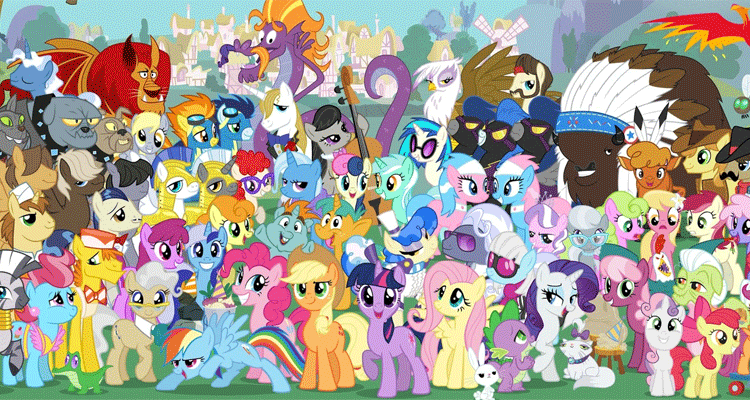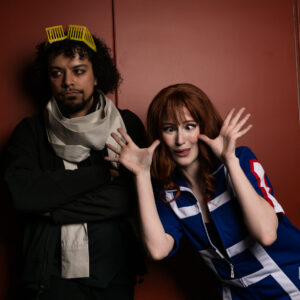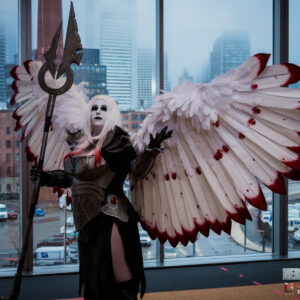Gender Nonconformity is Magic

I defend My Little Pony often. QUITE often in fact. I’d say it’s a guilty pleasure but I have absolutely zero guilt about this. My Little Pony: Frienship is Magic has been able to crash through the stained glass ceiling of TV shows aimed at young girls and was able to attract a young as well as older male audience without compromising it’s pink, heart-filled, unicorn party aesthetic which by all rights should have driven away any and every boy who came in contact with it. So what? Why does My Little Pony matter? Why would you write this post in honor of Transgender Awareness week and International Transgender Day of Remembrance?
To answer that I looked back at an article Lauren Faust, the series creator and Season 1 executive producer/head writer, wrote on Ms. Magazine Blog in defense of a scathing review of the show claiming it had Racist, Homophobic, and anti-intellectual sentiments:
There are lots of different ways to be a girl. You can be sweet and shy, or bold and physical. You can be silly and friendly, or reserved and studious. You can be strong and hard working, or artistic and beautiful. This show is wonderfully free of “token girl” syndrome, so there is no pressure to shove all the ideals of what we want our daughters to be into one package. There is a diversity of personalities, ambitions, talents, strengths and even flaws in our characters–it’s not an army of cookie-cutter nice-girls or cookie-cutter beauty queens like you see in most shows for girls.
I bring this up for two reasons. Most programming with an aesthetic that hugs close to the female spectrum is either dismissed or churned into a fluff piece where all women are indistinguishable except for the clothing they wear or one note female stereotypes. They fit the idea of femininity and womanhood into a VERY small, frail, box. MLP presents a matriarchy and a world populated predominantly (but not exclusively) by women who don’t crumble when problems arise. Each has strength and weakness.
But all of that is stuff people have written about since day one. Whether the show intends to or not the fact that this show has been able to attract and keep a male audience truly challenges the gender dichotomy. It says that not only are writers and producers interested in creating a show that is VERY traditionally feminine but that everyone can be interested in it. By starting to break the gender dichotomy the show also opens doors for many transgender individuals who have always felt they have to fit neatly into one category or the other.
Both cisgender boys and girls can watch the show and gain an appreciation and respect for their/the opposite gender’s capacity to be just as strong and brave but also remain feminine, but it also teaches that it’s OK not to fit a mold. That’s where MLP:FiM, while containing no transgender characters, can be used as a tool to help transgender youth. The show has proven that it’s feminine but not about perpetuating a right vs. wrong attitude towards gender expression. When speaking of Rainbow Dash, Faust stated “She is a tomboy, but nowhere in the show is her sexual orientation ever referenced. As we all know, there are plenty of straight tomboys in the world, and assuming they are lesbians is extremely unfair to both straight and lesbian tomboys.” The fact that Rainbow Dash is a tomboy means nothing aside from the fact that she is a tomboy. She is no less a woman and her sexual orientation does not play into it.
Now after Ms. Faust left Season 2 had its moments which seemed a bit out of character such as the fact that there was more violence throughout the season, and the “Babies” episode which seemed like it could have done a complete 180 and made a fluff episode about how all the women should “oohhh” and “awww” the cute babies in order to sell some MLP baby toys. It HOWEVER did not do this and actually had a very funny and cute episode less about the babies being cute (but they are so it’s unavoidable) but was instead about Pinkie Pie the party animal learning to be responsible.
Whether it’s Fluttershy conquering her fear of Dragons, Twilight Sparkle travelling through time, or Rainbow Dash asserting her awesomeness, the show has been able to thrive without compromising who it is (Much), and without feeling pressure to conform just because of its “intended” gender. While Ms. Faust mentioned that “There are many ways to be a girl,” it also implies there are many ways to be a boy, and that there are many ways embrace you as you are and to not care so much about how society feels you should be. I wish a show like My Little Pony: Friendship is Magic existed when I was a kid, but regardless of gender I look forward to exposing my future children to it.



